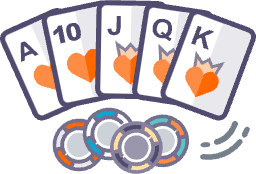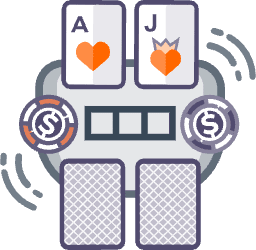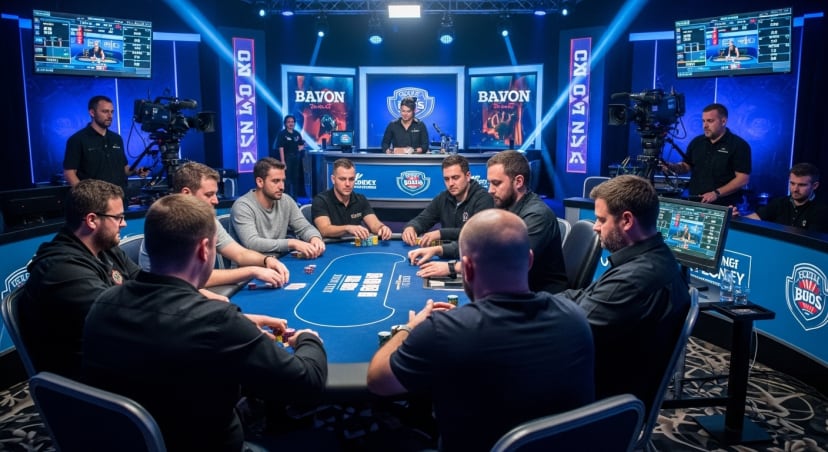Answering Questions About a Good Live Dealer Poker Strategy

Live dealer poker requires a sharp strategy. Unlike the usual online poker games where anonymity and algorithms call the shots, live dealer games bring in real-time interactions and visible dealer dynamics. This adds layers of complexity, making players adapt their game. In this article, we'll dive into the nuances of live dealer poker strategy, exploring how it differs from standard online methods. We'll tackle key questions to help you refine your approach, ensuring you're ready for the unique challenges and chances that come with this more engaging way to play poker in South Africa.
Getting Ready for Live Dealer Poker
Preparing for a live dealer poker game at an online casino site in South Africa means getting to grips with the live dealer environment and its quirks. Start by familiarising yourself with the specific platform's interface and features to ensure you can navigate smoothly during play. It's also crucial to adjust to the pace and flow of live play, which often feels different from the faster, algorithm-driven rhythm of regular online poker.
Being observant is key; watching how the dealer shuffles and deals, as well as noting other players' reactions and interactions, can offer valuable insights. Also, make sure you have a stable internet connection and a quiet space free from distractions to maintain focus and pick up on cues in this more personal and dynamic setting. This prep work doesn't just improve your play; it also makes playing poker at a live online casino more enjoyable.
Bet Sizing in the Live Dealer Arena
Smart bet sizing in live dealer poker, especially online, is a crucial skill that can really change the game's outcome. The trick is to adjust your bets based on the game's flow and how your opponents tend to play. In live dealer games, where you can see players' reactions in real time, it's vital to tailor your bets not just on your hand's strength, but also on what you perceive your opponents might have. For instance, betting bigger against tighter players might make them fold, while smaller, value bets could keep them in the game longer. On the flip side, against aggressive players, raising your bet could exploit their tendency to call or re-raise too freely. It's also important to consider the game stage; betting pre-flop needs a different approach than post-flop. Constantly reading the table's vibe and player behaviours will help guide your bet sizing decisions, making it a vital strategy for South African players.
Bluffing in a Live Dealer Setting
Bluffing in live dealer poker, compared to standard online poker, requires a more careful approach because the game is interactive and observable. In a live dealer scenario, where everyone's reactions can be watched, effective bluffing involves:
- Reading Body Language: Use the visual aspect to your advantage by observing how opponents react to bets and plays. Look for tells or signs of hesitation you can exploit.
- Controlling Your Own Tells: Keep a consistent demeanour, whether you have a monster hand or are bluffing, to avoid giving away any clues.
- Selective Bluffing: Bluff wisely. Bluffing too often can make you predictable, while bluffing too little means you might miss chances to exploit opponents' weaknesses.
- Timing Your Bluffs: Pick your moments, especially when opponents seem unsure or when the community cards suggest a hand that could reasonably be in your range.
- Size Your Bets Appropriately: Adjust your bet size to make your bluff believable. A bet that's too small might not deter opponents, while a bet that's too large could raise suspicion.
Handling Pressure in High-Stakes Poker Games
To navigate the high-pressure environment effectively:
- Stay Emotionally Balanced: Maintain a calm demeanor, regardless of the game’s ups and downs. Practice techniques like deep breathing or taking brief breaks to manage stress and keep a clear head.
- Set Defined Limits: Before entering a high-stakes game, set clear limits for yourself in terms of maximum loss and stick to them. This prevents the pressure from escalating beyond your comfort zone.
- Focus on Decision-Making, Not Outcomes: Concentrate on making the best decisions with the information at hand rather than fixating on the potential outcomes. This approach reduces the emotional weight of each hand.
- Learn from Each Hand: View high-pressure situations as learning opportunities. Analyze your play post-game to understand what worked and what didn’t.
- Avoid Tilt: Recognize when emotions start influencing your decisions ("going on tilt") and take a step back. Tilt can cloud judgment and lead to costly mistakes.
Utilizing Advanced Poker Strategies
Mastering these techniques not only elevates your skill set but also gives you an edge over less experienced players. Key advanced strategies include:
🔄 Check-Raising:
- Utilize check-raising to disguise the strength of your hand, especially when out of position.
- It is effective in situations where you predict opponents will bet, but your hand is strong enough to warrant a raise.
🌊 Floating the Flop:
- Employ this tactic against aggressive players who frequently continue to bet.
- Call a bet on the flop with the intention of taking away the pot on later streets, particularly if the opponent shows weakness.
🥁 Multi-Barreling:
- Extend the pressure across multiple betting rounds to convince opponents you have a strong hand.
- It is useful in scenarios where board textures change in ways that can realistically improve your perceived range.
- Ensure that opponents' tendencies and fold frequencies are assessed to gauge the effectiveness of this strategy.
🃏 Semi-Bluffing:
- Bluff with hands that have the potential to improve, like drawing hands.
- This approach balances the risk of bluffing with the safety net of potentially hitting a strong hand.
Adapting to Different Types of Players
Adapting your strategy to different types of players is crucial in live dealer poker games at online casinos. Recognizing and adjusting to various opponent profiles can significantly impact your success:
🐯 Against Aggressive Players:
- Tighten up your play. Be selective with your starting hands and wait for strong holdings.
- Use their aggression against them; let them drive the action when you have a strong hand.
🐢 Facing Passive Players:
- Exploit their reluctance to bet or raise by taking control. Increase your aggression to steal more pots.
- Be cautious when they show strength, as passive players often indicate strong hands with rare bets.
🦊 Dealing with Tight Players:
- Expand your range. You can often bluff more effectively against tight players, as they are more likely to fold.
- Be ready to back down if they show resistance, as they tend to play only strong hands.
🦜 Playing Against Loose Players:
- Value bet more often. Loose players are likely to call with weaker hands, so maximize your winnings with strong hands.
- Avoid bluffing excessively, as they are prone to call bets with a wide range of hands.
Leveraging Technology in Live Dealer Poker
Technology plays a pivotal role in enhancing player strategy. One of the most significant technological aids is the Heads-Up Display (HUD), which provides real-time statistics and data on opponents, helping players make informed decisions based on playing patterns and tendencies.
Additionally, note-taking during games is crucial; many platforms offer digital note-taking features, allowing players to record observations about their opponents' strategies and behaviors. This becomes an invaluable reference in future live casino game sessions.
Another helpful tool is hand history trackers that enable players to review and analyze played hands, offering insights into both their own and their opponents' gameplay. Equally important are software tools for odds calculation, which assist in making mathematically sound decisions. By effectively leveraging these technological tools, players can gain a competitive edge, adapting their strategies more precisely to the nuances of each game and opponent.
Learning from Mistakes
A critical practice in this learning process is the review of poker hand histories. Many online platforms offer the ability to revisit previous hands, providing an opportunity to analyze and reflect on one’s decisions. This retrospection enables players to identify strategic errors or missed opportunities, fostering a deeper understanding of their playstyle and tendencies.
Additionally, discussing hands with peers or seeking feedback from more experienced players can offer new perspectives and insights. It's also vital to view mistakes not as failures but as valuable lessons. Embracing a mindset of continuous improvement, where each hand offers a chance to learn something new, can significantly enhance a player's approach to the game. By consistently reviewing and learning from gameplay experiences, players can refine their strategies, avoid repeating past errors, and make more informed decisions in future sessions.
Conclusion
From preparing for the unique dynamics of live play and adapting to different player types to leveraging technology and learning from mistakes, each aspect contributes to a more rounded and effective strategy. Embracing advanced tactics like check-raising and bluffing while managing the pressures of high-stakes games further refines your skills. Remember, continuous learning and adaptation are key in the ever-evolving landscape of online live poker.
For a deeper understanding and to enhance your gameplay, we encourage you to explore more articles on LiveCasinoRank, where you can familiarize yourself with various online live poker variations and strategies. Your journey to becoming a proficient live dealer poker player starts here.
FAQ
How should I prepare for a live dealer poker game in South Africa?
Preparation involves getting comfortable with the live dealer platform, understanding the game's rhythm, carefully observing dealers and other players, and ensuring you have a reliable internet connection for smooth gameplay. Consider doing a test run with a smaller stake to get a feel for the experience.
What are some good bet sizing strategies for live dealer poker?
Good strategies include varying your bet sizes based on how the game is unfolding and how your opponents are playing. Be more aggressive against players who tend to be passive, and play more cautiously against aggressive players. Think about the pot size and your position at the table when deciding how much to bet.
How is bluffing different in live dealer poker compared to regular online poker?
In live dealer poker, bluffing involves trying to pick up on subtle cues in player behavior, which requires a more sophisticated and psychological approach than in standard online poker where you only see screen names and betting patterns. Pay attention to how players react to different situations.
What are some strategies for handling pressure in high-stakes live dealer poker games in South Africa?
To manage pressure, try to stay calm and balanced, set clear limits on how much you're willing to lose, concentrate on making good decisions rather than worrying about the outcome of each hand, learn from every hand you play, and avoid letting emotions cloud your judgment (tilt).
How can I use technology to improve my live dealer poker strategy?
You can use Heads-Up Displays (HUDs) to get real-time stats on your opponents, take digital notes to track their strategies, use hand history trackers to review your past play, and use odds calculators to help you make informed decisions. Just be sure to check the casino's rules on using these tools.
How should I change my strategy when playing against different types of players?
Adjust your play by being more cautious against aggressive players, playing more aggressively against passive players, widening the range of hands you play against tight players, and betting more often against loose players. Pay attention to their tendencies and adjust accordingly.
How can players in South Africa learn from their mistakes in live dealer poker?
Review your hand histories to see where you went wrong, discuss hands with other players or a coach to get feedback, and think of mistakes as chances to learn and improve your decisions in the future. Remember responsible gambling is key, set limits and stick to them.

















